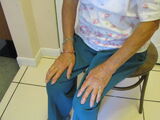"With young children, music therapy provides a unique variety of music experiences in an intentional and developmentally appropriate manner to effect changes in a child’s behavior and facilitate development of his/her communication, social/emotional, sensori-motor, and/or cognitive skills. Music therapy enhances the quality of life. It involves relationships between a qualified therapist and child; between one child and another; between child and family; and between the music and the participants. These relationships are structured and adapted through the elements of music to create a positive environment and set the occasion for successful growth.
How Does Music Therapy Make a Difference with Young Children?
- Music stimulates all of the senses and involves the child at many levels. This “multi-modal approach” facilitates many developmental skills.
- Quality learning and maximum participation occur when children are permitted to experience the joy of play. The medium of music therapy allows this play to occur naturally and frequently.
- Music is highly motivating, yet it can also have a calming and relaxing effect. Enjoyable music activities are designed to be success-oriented and make children feel better about themselves.
- Music therapy can help a child manage pain and stressful situations.
- Music can encourage socialization, self-expression, communication, and motor development.
- Because the brain processes music in both hemispheres, music can stimulate cognitive functioning and may be used for remediation of some speech/language skills" (AMTA).
American Music Therapy Association, Inc. Music Therapy and Young Children. Retrieved
January 13, 2013 from http://www.musictherapy.org/assets/1/7/MT_Young_Children_2006.pdf
All items (42)







